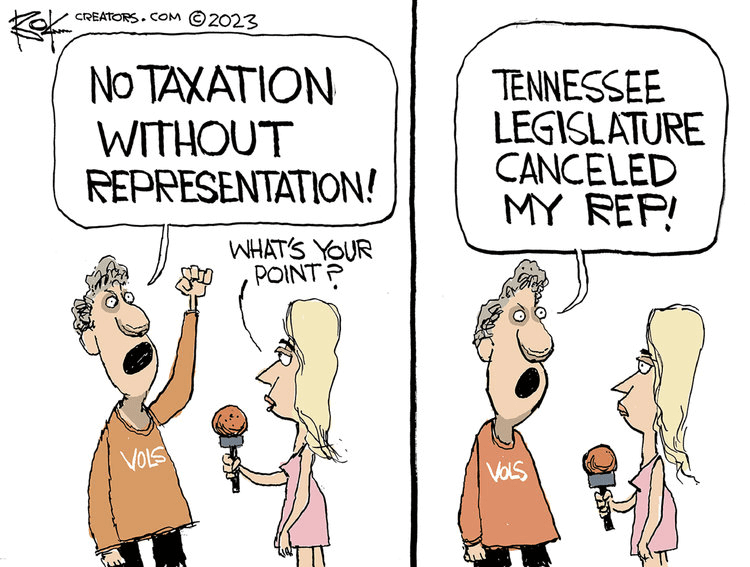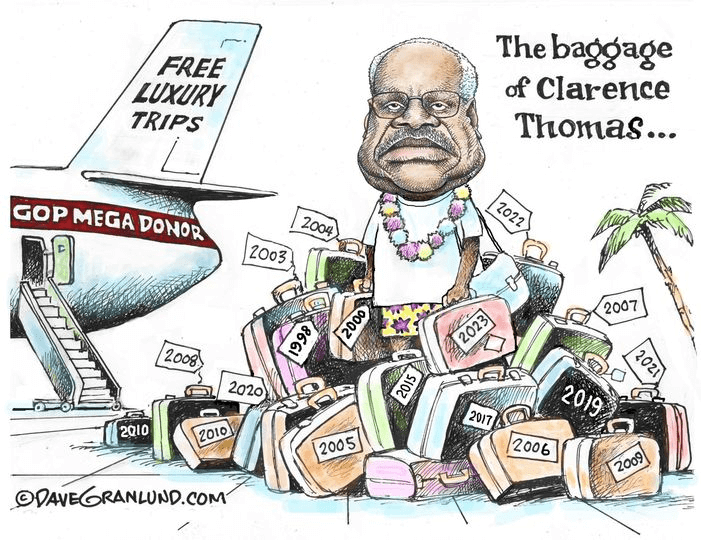CSotD: Seeking Asylum
Skip to commentsLyndon offers an optimistic thought in this morning’s Pros & Cons (KFS): As bad as things appear at the moment, we can still hope that incompetence will overcome megalomania, greed and corruption. It always has in the past, though, granted, that’s of little consolation for those crushed before the inevitable collapse.
But, with luck, our grandchildren will look back on this era and ask what in the hell we thought we were doing, and why we didn’t do more.
Some of us will have answers and some of us will not.
Clay Bennett (CTFP) mourns the death of democracy in Tennessee, and his local readers will recognize the state flag. It’s a simple statement in Chattanooga, but, for readers elsewhere, it doesn’t take a lot of expertise and imagination to recognize what event he is commenting on.
Sometimes less is more, and labels would ruin the moment.
On the other hand, Pat Byrnes offers an angry response that does require the viewer to have a little background in the Civil Rights struggle, at least enough to recognize Nina Simone’s classic of fury:
I can’t stand the pressure much longer
Somebody say a prayer
Alabama’s gotten me so upset
Tennessee made me lose my rest
And everybody knows about Mississippi Goddam
If people elsewhere — people who relied on the news instead of the lessons forced upon them in their own lives — did not know what was happening then, it was no accident.
It wasn’t — they weren’t — considered newsworthy.
A few years ago, as this article in the Columbia Journalism Review explains, the apologies began:
In 2004—the fortieth anniversary of the Civil Rights Act of 1964—the Jackson Sun, in Tennessee, acknowledged that it had ignored or downplayed local civil rights efforts in its pages. Next up was Kentucky’s Lexington Herald-Leader, which likewise apologized for failing to cover the struggle for equality in its home city. Mississippi’s Hattiesburg American apologized for ignoring the 1964 Freedom Summer protests; in Alabama, the Birmingham News ran a series of photographs depicting the fight for civil rights—images its editors had previously suppressed. A similar apology ran in the Waco Tribune-Herald, in Texas, for coverage of the gruesome 1916 lynching of a seventeen-year-old named Jesse Washington.
The article goes on and on, with links to those apologies, but nobody had to tell Nina Simone, or Billie Holiday, or anyone else living under the heel of Jim Crow and, perhaps worse, living under the hollow falseness of society’s ignorance.
You might be lynched in Mississippi, but you weren’t going to find equality and acceptance in South Boston or Detroit either.
The whole world is, finally, watching today, and Clay Jones captures the response to Tennessee’s ouster of two young Black legislators for having broken rules of decorum that might have been cause for a reprimand if they hadn’t appeared uppity to their fellow legislators.
By now, nobody with an open heart and a sense of decency has any doubt about the term “uppity,” and Jones didn’t pull it out of a hat: One of the expelled legislators used the term himself to describe what had happened, and why.
Several other observers have pointed out that a reprimand would have gone unnoticed, but the expulsions — including the bizarre vote to spare the white legislator among the three — have not simply attracted national attention but made heroes of the three.
Even Chip Bok (Creators), normally in lockstep with the rightwing, recognizes that the expulsion is not only a reflection of the injustice that sparked this country’s revolution, but an example of the rank hypocrisy of Republican complaints over “cancel culture.”
While conservatives are knotting their knickers and issuing violent threats over a beer company’s marketing to a diverse audience, their party is disenfranchising thousands of citizens for having elected uppity representatives.
As Lyndon noted, lunatics are rarely proficient in the smooth running of their asylum.
If they can’t get enough women to oppose them at the polls by overturning Roe v Wade, they’ll gin up the Black vote with this kind of asinine, self-defeating stunt.
And then there is Clarence Thomas, and Dave Granlund illustrates his long, astonishing history of accepting extremely expensive vacations from a GOP activist, as outlined in Pro Publica’s jaw-dropping expose.
It’s bad enough that he accepted the trips in the first place. As a reporter, I was uncomfortable when someone I was interviewing bought me a beer. I never had to wonder if I should accept a half million dollar exploration of Indonesia on a private yacht, flown there on a private plane.
Apparently, Clarence didn’t, either, because he never reported the vacations as the law requires.
His explanation is that he was being entertained at the private home of a personal friend, which is a loophole only if you are either stupid enough or dishonest enough to accept it.
Pat Bagley is not falling for the “personal friend” exception, or the mealy-mouthed excuse that, because Crow has no actual, personal case before the Court, that he has no interest in cultivating an ally on the bench.
Or that his donations to Ginni Thomas’s rightwing Big Lie causes were not an attempt to influence her husband and that it was a pure coincidence that Clarence Thomas was the only justice who voted to block the Jan 6 Committee from being allowed to access Donald Trump’s records.
I guess the other eight justices hadn’t seen enough of Indonesia’s wildlife, or smoked enough cigars with conservative fat cats at Crow’s exclusive Topridge hideaway, to fully comprehend the legal aspects of the case.
It is, perhaps, unfair of Jeff Danziger to suggest that Clarence Thomas is not truly seen as “one of the guys” on these junkets. He may have been prejudiced by having watched Thomas’s confirmation hearings, in which he appeared to be accepted by conservative Republicans.
He was viewed with considerably more skepticism by a significant portion of the Black community, as this controversial Essence cover suggested at the time.
But that was 32 years ago. Justin Pearson hadn’t been born yet, nor had the hordes of Millennials and Gen Z’s who packed the Tennessee capitol this week and who will pack the voting booths at the next election.
As the song says, “He who gets hurt will be he who has stalled.”
Even if he thinks he’s still running the asylum.











Comments 10
Comments are closed.